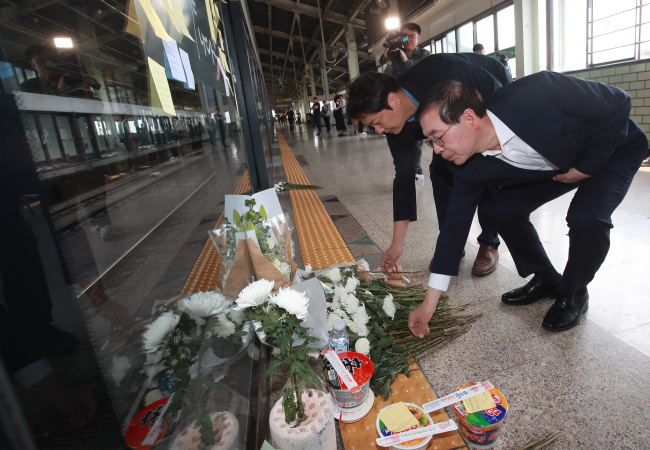On May 28, 2016, a 19-year-old repairman was crushed to death by an incoming subway train while working on a malfunctioning safety door at Seoul’s Guui Station.
Safety guidelines that repair crew should work in pairs and train operation should be halted while they are on tracks were ignored to minimize the convenience of passengers. The victim, surnamed Kim, was all by himself on the tracks, and the train’s conductor was not informed of the ongoing maintenance work.
One year later, nine officials at subway operator Seoul Metro and its subcontractor in charge of door maintenance work, the employer of the victim, were prosecuted Monday for failing to observe safety guidelines.
However, subway workers still feel they are at risk -- not just on subway railroads, but at shipyards, factories and other risky workplaces. Many workers say money often comes before their safety.
Safety guidelines that repair crew should work in pairs and train operation should be halted while they are on tracks were ignored to minimize the convenience of passengers. The victim, surnamed Kim, was all by himself on the tracks, and the train’s conductor was not informed of the ongoing maintenance work.
One year later, nine officials at subway operator Seoul Metro and its subcontractor in charge of door maintenance work, the employer of the victim, were prosecuted Monday for failing to observe safety guidelines.
However, subway workers still feel they are at risk -- not just on subway railroads, but at shipyards, factories and other risky workplaces. Many workers say money often comes before their safety.

“A lot of news went on about more surveillance cameras and emergency exits installed around tracks at subway stations after the accident. But those emergency doors that open from the tracks are only installed at a few stations,” said Lim Seon-jae, 34, a contract worker from Seolleung PSD, another subcontracted subway platform maintenance company.
After the death, Seoul Metro hired 50 new employees to augment workplace safety. Now, employers must strictly abide by the rules and have to work in pairs.
But without a supply of sufficient new workers, it has only increased their workload, the company’s labor union said. Seventeen workers work 15 hours a day, covering over 30 subway stations, it claimed.
“Unlike regular employees who work on a double shift rotated by four teams, contract workers only have three teams working a double shift,” a labor union member surnamed Kim told The Korea Herald.
“Not many people know that non-regular workers are still demanding improved treatment, because the changes (following the accident last year) were only applied to regular employees.”
He said that at least 40 more workers are needed to guarantee safety.
Experts agree that subcontracted employees, who take up high-risk jobs that are outsourced, remain vulnerable to industrial accidents.
According to statistics, about 87 percent of all workers who died from industrial accidents last year were working for subcontracted companies.
“While the current law is insufficient to secure the safety of workers from subcontracted companies from industrial accidents, the entire labor environment will not easily improve,” said Lee Byung-hun, a professor of sociology at Chung-Ang University.
“There should be stronger legal penalties for safety violations in environments such as construction or maintenance sites,” he added.
Some civic groups claim that a fundamental fix is possible only when those assuming high-risk tasks are treated equally with regular workers. When outsourced, workers’ safety could be sacrificed for the sake of cost reduction as small companies compete to land a contract.
“The current employment system can only fundamentally changed when more regular jobs are created with equal wage and treatment,” said Lee Nam-shin, director of Manwonhaengdong, a civic movement calling for the minimum wage to be set at 10,000 won ($8.90) and the abolishment of non-regular jobs.
“The only way to prevent deaths like Kim’s is to start off by transferring irregular workers in the public sector to regular status,” he said.
Seoul Mayor Park Won-soon vowed to prevent subway workers’ accidents.
“I admit that all those errors that occurred a year ago from the accident are yet to be completely corrected. I will try and try again to protect the dreams and safety of young workers like Kim.”
In a Facebook post, Sim Sang-jeong of the progressive Justice Party urged the National Assembly to pass a bill to better protect subcontracted workers from workplace accidents.
“Last year in June, a revision to the current Industrial Safety and Health Act was submitted to the National Assembly but was discarded after lawmakers failed to endorse it. A year later, I request lawmakers again to carry out their responsibility and make change in irregular workers’ lives,” she wrote.
“If the current employment system continues as it is, accidents like the Sewol ferry sinking and the death of the young worker at Guui Station will happen again.”
By Kim Da-sol (ddd@heraldcorp.com)


![[Herald Interview] 'Amid aging population, Korea to invite more young professionals from overseas'](http://res.heraldm.com/phpwas/restmb_idxmake.php?idx=644&simg=/content/image/2024/04/24/20240424050844_0.jpg&u=20240424200058)














![[KH Explains] Korean shipbuilding stocks rally: Real growth or bubble?](http://res.heraldm.com/phpwas/restmb_idxmake.php?idx=652&simg=/content/image/2024/04/25/20240425050656_0.jpg&u=)

